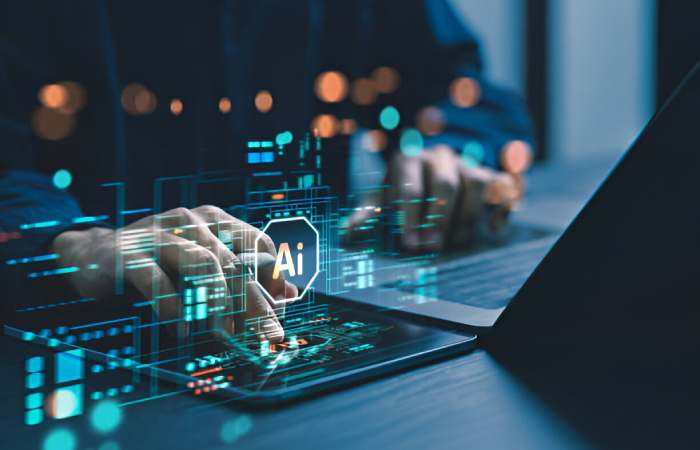Have you ever wondered if the rapid advancement of artificial intelligence means your dream of becoming a full-stack developer might be short-lived? Many aspiring and current developers are asking this question, and with good reason. The technological landscape is evolving unprecedentedly, and AI tools are becoming increasingly sophisticated. But the truth is this: AI won’t replace full-stack developers; it will transform the profession, making it more efficient, innovative, and fun than ever.
The Rise of AI in Software Development
Integrating AI into software development isn’t a futuristic concept; it’s a fact. From intelligent code completion to automated testing, AI quickly becomes an indispensable developer assistant. Think of AI as a powerful assistant that handles repetitive and time-consuming tasks, freeing developers to tackle more complex and creative endeavours. This shift isn’t about AI taking over; it’s about augmenting human capabilities to deliver faster workflows, more innovative tools, and, ultimately, better results. It’s like having a super-efficient intern who never sleeps and learns quickly.
Full Stack Development: A Shifting Landscape
The role of a full-stack developer has always been dynamic and requires a broad skill set in front-end, backend, and database technologies. The advent of AI tools means developers must adapt and acquire new skills. It’s no longer just about writing code from scratch but understanding how to use AI-based platforms to generate, optimise, and debug code more efficiently. This evolution requires ongoing training, prompting developers to explore areas such as machine learning fundamentals, sponsored development, and data science to leverage AI’s power fully. For example, a course for a Java full-stack developer might now include modules on integrating AI libraries or using AI to optimise performance in Java applications.
AI Tools Every Full Stack Developer Should Know

The market has AI tools designed to simplify and increase developer productivity. They’re not just futuristic devices, but practical applications you can integrate into your daily workflow. One of the most prominent examples is GitHub Copilot, an AI pair programmer that suggests code snippets and even entire functions as you type. Imagine how much time this saves writing repetitive code or searching for syntax! Similarly, AI-powered automated testing and debugging tools can identify bugs and suggest solutions much faster than manual processes.
This means less tedious bug hunting and more time spent developing innovative features. Beyond code development, AI is also making its way into design. It offers tools to generate UI components or suggest design patterns based on user input, further streamlining the development process from conception to implementation. Learning to use these tools effectively is becoming an essential part of any modern full-stack developer course.
The Human Element: Why Developers Remain Indispensable
Despite AI’s impressive capabilities, fundamental aspects of end-to-end development remain uniquely human. AI can process data and generate code, but lacks the nuanced understanding of human needs, business logic, and creative problem-solving that distinguish a truly exceptional developer. Consider the initial phase of any project: sympathetic the client’s vision, translating abstract thoughts into concrete functionality, and predicting user behaviour. These tasks require critical thinking, empathy, and communication skills that AI cannot replicate.
Furthermore, innovation often emerges from creative breakthroughs and solutions in areas where human intuition and experience far outweigh algorithmic processes. Collaborating on a development team, mentoring junior developers, and managing complex project requirements are fundamental human activities AI can assist with but never fully replace. The ability to interact with stakeholders, interpret feedback, and adapt to changing requirements makes a developer indispensable. It’s not fair about writing code, it’s about creating solutions that truly benefit people.
Navigating Your Career: Upskilling in the AI Era
If AI doesn’t take your job, how should you thrive in this new era? The response is simple, yet profound: continuous learning and adaptation. The most successful full-stack developers in the coming years will be those who view AI as a powerful ally, not a threat. This income actively seeking out opportunities to learn AI tools and how to integrate them into their workflow. Think of it this way: a carpenter who knows how to use power tools won’t become obsolete; they’ll become more efficient and capable. Similarly, developers who master AI tools can build more complex and innovative applications in less time.
The key is to view AI as an extension of your capabilities, a copilot that helps you navigate the complexities of modern software development. Don’t just learn AI; learn with AI. Experiment, create, and discover how these tools can amplify your impact. The coming belongs to those willing to learn, adapt, and innovate.
The Synergy of Human and Artificial Intelligence

It’s critical to understand that the relationship between full-stack developers and AI is not one of competition but of synergy. Imagine an expert architect designing a magnificent building. AI can create blueprints, optimise structural integrity, and visualise the final product. Still, the architect’s vision, understanding of human needs, and creative problem-solving truly bring the building to life. Similarly, AI can handle repetitive, data-intensive tasks in software development, allowing developers to focus on high-level strategic thinking, innovative design, and complex problem-solving that only human intelligence can address.
For example, consider the process of creating new functionality for a web application. An AI-powered tool can quickly generate the basic code for a UI component or a backend API endpoint. However, the full-stack developer understands the complex business logic, the nuances of the user experience, and how the new functionality integrates with the existing system. They can anticipate potential problems, develop elegant solutions, and ensure functionality fits into the product concept. This collaborative approach allows developers to accomplish more in less time, resulting in shorter development cycles and more reliable and user-friendly applications. Therefore, today’s comprehensive full-cycle developer course pays special attention to programming and systems design, architecture, and problem-solving methodologies.
The Evolving Skillset: Beyond Traditional Coding
The evolution of the full-stack developer role in the era of artificial intelligence requires a constantly evolving skill set. While proficiency in languages like Python, JavaScript, and Java remains essential, the focus is increasingly shifting to areas that complement AI capabilities. These include:
Hint Development
Ability to create practical hints for AI models to generate the desired code, content, or design.
Data Literacy
Understanding how AI models collect, process, and use data, as well as how to ensure their privacy and security.
AI Model Integration
Understanding how to integrate pre-trained AI models or APIs into applications and how to optimise them for specific use cases.
Ethical AI
Understanding the moral implications of AI use and ensuring responsible and fair application development.
DevOps and MLOps
As AI models become integral to applications, understanding how to deploy and manage them in production becomes crucial.
These new skills don’t replace traditional development experience but complement it, increasing developers’ versatility and value in an ever-evolving technological landscape. The future of end-to-end development lies in mastering code and context, using AI to create more innovative, efficient, and practical solutions.
Conclusion: The Future is Collaborative
Whether AI will replace full-stack developers isn’t a question of replacement but evolution. The truth is, AI isn’t a competitor, but a powerful assistant. It’s transforming the development landscape by automating routine tasks, increasing efficiency, and opening up new opportunities for innovation. Full-stack developers are not only not becoming obsolete, but are poised to become even more influential by using AI to create more complex, intelligent, and user-centric applications.
The future of full-stack development isn’t about machines replacing humans, but about humans and AI working together. It’s a future where AI’s speed and analytical power will amplify developers’ creativity, critical thinking, and problem-solving skills. So, instead of fearing AI, embrace it as an essential part of your toolset.

